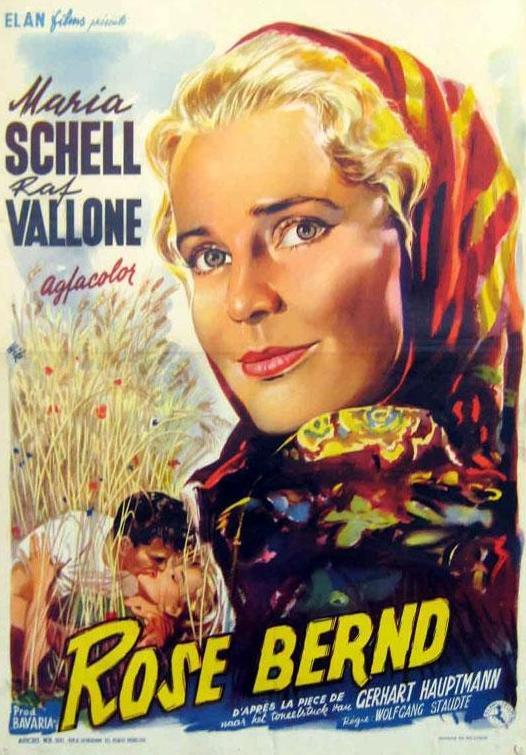

Raf Vallone was born in Calabria, Italy in 1917. He studied Law and Philosophy at the University of Turin. He also played professional football. His first film appearance was in “We the Living” in 1942. In 1949 hemade his breakthrough in “Bitter Rice” with Silvana Mangnao and Vittorio Gassman. He made many international films such as “The Cardinal” in 1963, “Harlow” with Carroll Baker and Angela Lansbury which was made in Hollywood in 1964 and “The Other Side of Midnight” in 1977. He died in Rome in 2002.
His “Guardian” obituary by John Francis Lane:
Raf Vallone, who has died aged 86, was one of the few non-professional actors to emerge from Italian neo- realist cinema and enjoy a distinguished career as a professional, on the screen and stage. A former journalist, he won international fame for his electrifying performance as the hot-headed Italian-American, Eddie, in Arthur Miller’s A View From The Bridge, a role he played in Peter Brook’s Paris stage production and in Sidney Lumet’s 1961 film, Vu Du Pont.
Vallone had been discovered by Giuseppe De Santis, who, in 1948, needed someone to research labour problems among the rice pickers of Piedmont for his film, Bitter Rice. In the Turin offices of the Communist party newspaper l’Unità, he met the writer Cesare Pavese, and Vallone, who wrote about sports and culture. After helping with the research, Vallone was surprised to find himself cast as the good-hearted ex-soldier whose girlfriend has befriended Silvana Mangano, the clandestine rice picker in hiding from the police with her good-for-nothing lover (Vittorio Gassman).
De Santis wrote in the preface to the screenplay: “I was impressed by Raf’s wide cultural and political awareness. Physically, he had the rugged looks of a sportsman. He had, in fact, played in a leading Turin soccer team. He was just the type I was looking for to play the nice guy. He was a natural.”
For Vallone, it meant a new career at the age of 31. Born in Calabria, he was only two years old when his family emigrated to Turin. He studied hard, getting a degree in letters and law. He joined the anti-fascist resistance, and, after the war, found a job with l’Unità.
After the favourable response to Bitter Rice, De Santis gave Vallone the lead role in his next film, Non C’è Pace Sotto Gli Ulivi (There’s No Peace Under The Olive Trees, 1950). Though not as successful in mixing social observation with melodrama, it confirmed his dramatic talents, winning him top billing in Cristo Proibito (Forbidden Christ, 1950), the only film made by the controversial Curzio Malaparte.
This was followed by an important role in Pietro Germi’s Il Cammino Della Speranza (The Road To Hope, 1951), an epic odyssey about southern Italians trekking north in search of work, and ending up in the Alpine snows desperate to cross the French border. The same year, he played Garibaldi, to Anna Magnani’s Anita, in Alessandrini’s Camicie Rosse (Red Shirts), though Suso Cecchi d’Amico has reported that the two stars did not hit it off.
Vallone worked again with De Santis in one of the director’s best films, Roma Ore 11 (Rome 11 O’Clock, 1952), based on the true story of a staircase that collapsed under the weight of unemployed girls waiting for a job interview. The scriptwriter Cesare Zavattini had wanted the casting to be non-professional, but De Santis preferred to use star names of the period, among whom at least Vallone still carried the air of neo- realist authenticity.
Dissatisfied with most of the films he made during the following years, Vallone decided to try the stage. While visiting London in 1956, he had seen Peter Brook’s production of A View From The Bridge, and felt that the role of Eddie was “made for him”. He had already worked in France, in films by Marcel Carné and Jean Delannoy, and courageously decided to risk what was virtually his stage debut, acting in French, comforted by Brook’s direction.
The production was a triumph and ran for 550 performances at the Thétre Antoine. The French translator Marcel Aymé had wanted to change the ending, leaving Eddie alive on stage, but Brook was against it, so Vallone got his death scene, which won ovations every night. He was the natural choice for Eddy in Sidney Lumet’s subsequent film, shot in both French and English versions, and, in later years, he directed the play himself in Italian.
On the Paris stage, he scored a success in Christiane Rochefort’s Le Repos Du Guerrier, and directed Pirandello’s Six Characters In Search Of An Author. In Italy, he did another Miller play, The Price, and, in 1969, he wrote, directed and acted in a play called Proibito Da Chi? (Forbidden By Whom?).
Among his many film appearances, Vallone is remembered for his cameos in, among others, Vittorio De Sica’s Two Women (1960), in which he played the grocer with whom Sophia Loren sleeps before fleeing from Rome with her daughter, El Cid (1961), The Cardinal (1963), Phaedra (1962), The Greek Tycoon (1978) and The Godfather Part III (1990).
In the early years of Italian television, he was Rochester in Jane Eyre (1960), and he won great popularity in the serial adaptation of Riccardo Bacchelli’s Il Mulino Del Po (1962). He was also in Alberto Lattuada’s mini series Christopher Columbus (1984). His last television appearance was in Vino Santo (2000) with Alida Valli, when, both in their 80s, they played grandparents celebrating their golden wedding anniversary. The director Zaver Schwarzenberger, former assistant and cameraman for Rainer Werner Fassbinder, described it as a “tragicomedy”.
Vallone was married to Elena Varzi, who had played his wife in Cammino Della Speranza (The Road To Hope, 1950). Both their son, Saverio, and daughter, Eleonora, are actors.
· Raffaele ‘Raf’ Vallone, actor, born February 17 1916; died October 31 2002


















